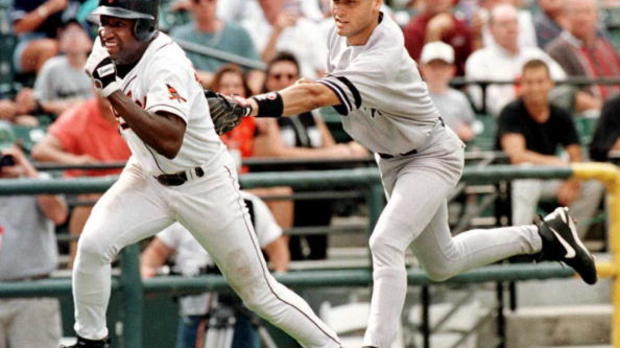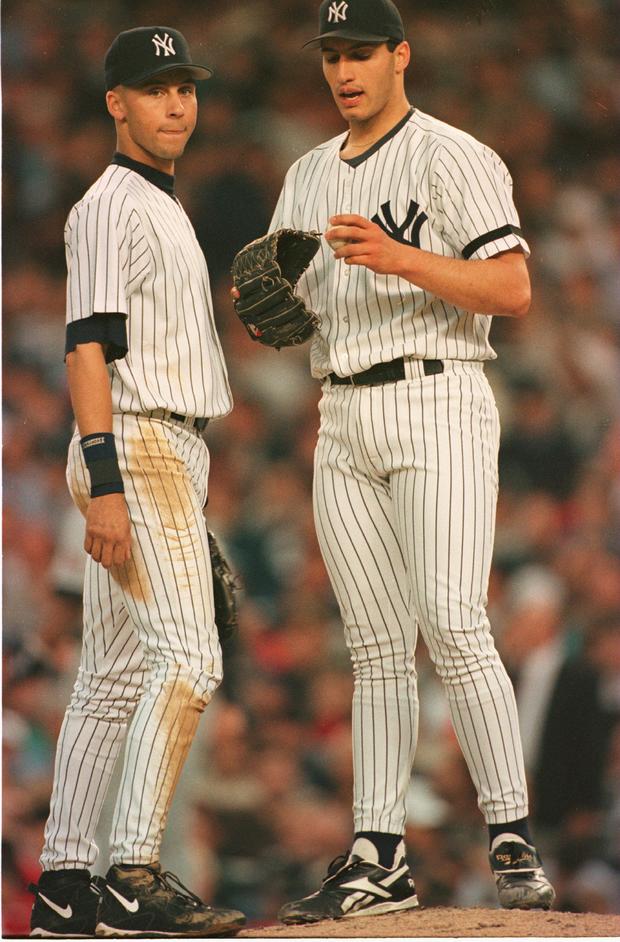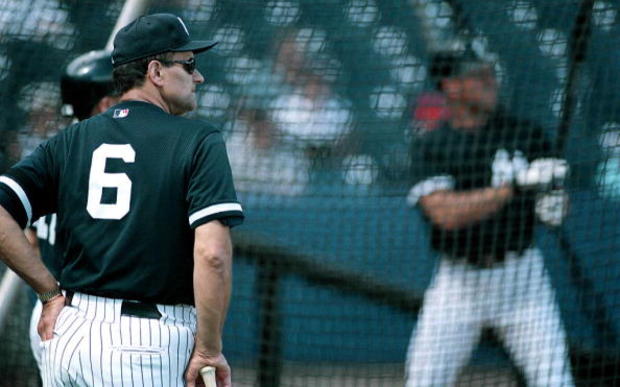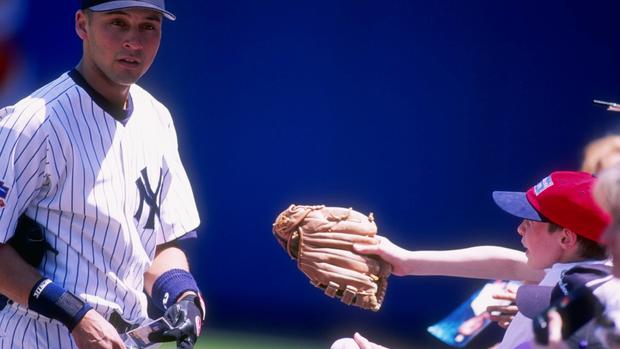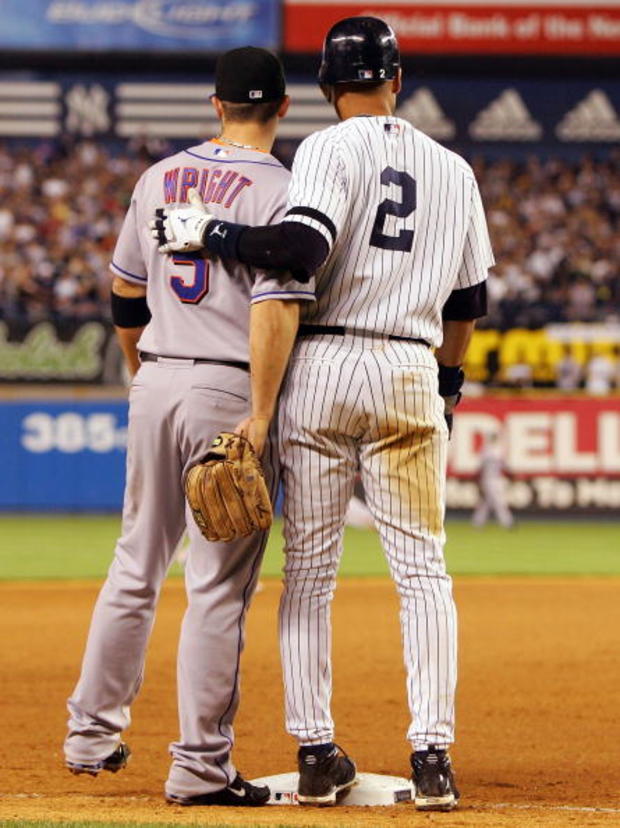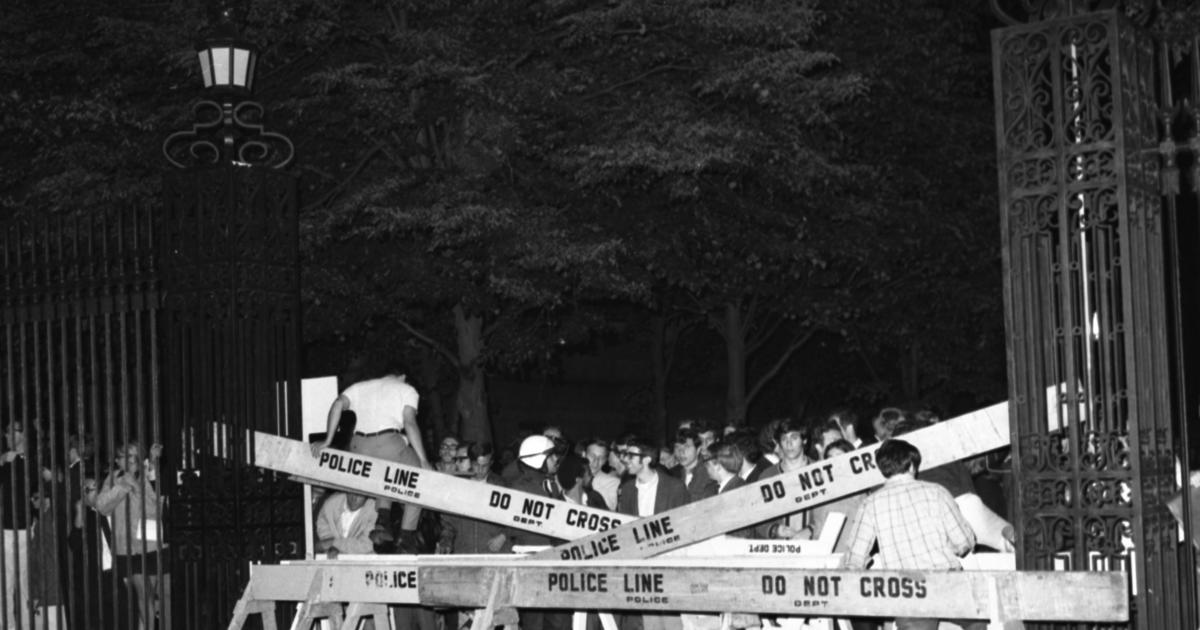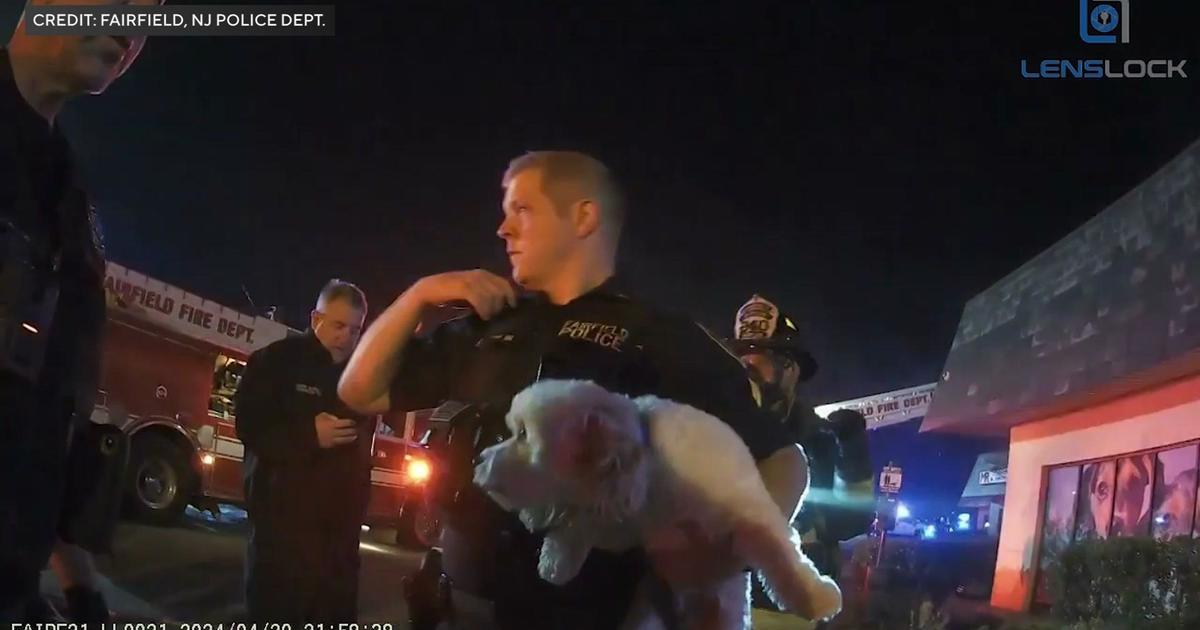Sweeny: Baseball Lifers Recall First Impressions Of Derek Jeter
By Sweeny Murti
» More Columns
Derek Jeter's entire career has been spent in the Internet age. So it's not hard to call up images of a 20-something Jeter and look back on his career. But for those who have spent time with him up close, they have a database that can't be Googled.
Jeter announced in February that he would retire at the end of this season. I have spent the last several months since then asking those around the Yankees and around baseball about their first memories of Jeter, whether it was in-person or on the field, seeing or meeting him.
From those who met him as a teenager to those who met him as a future first-ballot Hall of Famer, here is what they told me:
Ace Adams, former assistant coach and recruiter at the University of Michigan:
First time I saw him he was playing for Kalamazoo Central. He was about 15 years old and as skinny as the bat he was using. And I looked at him and said, "Oh my God, this kid is something else."
He was 15 and playing on the varsity, hitting third, always the first one to practice and the last one to leave. I followed him for years, got to know his parents, and I just fell in love with him.
He just stuck out like a sore thumb. It's like watching a great high school football running back or quarterback. There was him and there was everybody else. It isn't even comparable.
Just the way he went about it, his mannerisms are the same now as they were when he was in high school. Just low-key, hustled his a-- off, shined above everyone else.
We had Derek up for his official visit (in 1991) to Ann Arbor on a weekend we were playing Notre Dame. We brought him into this restaurant, The Cottage Inn, and the owner opened up the restaurant just for me, (Michigan Head Coach) Bill Freehan, Mr. and Mrs. Jeter, Derek and his host (a then-current Michigan baseball player). We were the only ones in the restaurant, and his mother turned to me--and this is unbelievable, because I loved this kid and so did Bill—his mother turned to me and said, "Mr. Adams, do you really think Derek can play here next year at Michigan?"
I go, "Play here??? Hold on a minute. Bill, Mrs. Jeter wants to know if Derek can play here next year."
Bill goes, "He's hitting third and playing short, that's the end of the story on that one."
His parents didn't even think he was good enough to play at Michigan!
Dick Groch, former Yankees scout:
The first time that I had an opportunity to see him was in 1991 in Mount Morris, Michigan and it was an evaluation camp. And when I walked into the park they were hitting ground balls and the first thing that he did was he went into the hole, fielded the ball, and did his classic jump pass/throw to first base—something that you just don't normally see a 16-year-old do. And from that point in time—during the whole camp—he had my undivided attention.
One of the concerns is that a high school player is very difficult to sign (to a contract once he's drafted), because of the college scholarship and (the Yankees) were concerned he might go to college. Plus he had a girlfriend who was going to be attending (Michigan) and that was always a factor. And finally (the front office) said, "Dick, is he going to go to the University of Michigan or not?" And I said, "No, the only place he's going is to Cooperstown." And I guess that had enough definitiveness in it to have them believe that I believed.
Buck Showalter, former Yankees manager:
First time I saw him was in the dugout at old Yankee Stadium (1992 after he was drafted and signed), his mom and dad and I think his sister were there. I remember how alert his eyes were and how he was taking everything in. A skinny little kid from Kalamazoo.
The thing that stuck out to me was his mom and dad and his sister and watching him interact with them, and I felt like a lot of things that challenge players off the field, especially in New York, were not going to be as much of a challenge for Derek. His upbringing was the thing that stuck out to me, how he interacted with people. He had good people skills.
Trey Hillman, former Yankees minor league manager:
I remember (the first time I saw him) very well. It was late in the '92 season, and I got a call from (then Coordinator of Instruction, current Senior VP Baseball Operations) Mark Newman, and he told me they were going to send up Derek Jeter to Greensboro. They wanted him to get acclimated to where he was going to be the following year. I wanted to make sure he felt welcome, as I would anybody. I knew he was young, so I got a message to the hotel and told him I would pick him up and get him to the ballpark the first day. So I picked him up, and he hadn't eaten yet, so we went to a Burger King. And I think between ordering the food at the drive-thru and getting to the ballpark he might have said 10 words. I mean, he was really quiet, very reserved, and yet confident.
The thing that probably sticks out to me more than anything else was how quickly he developed relationships on a team with a bunch of guys…those guys kind of gravitated to him. Everybody goes (mockingly), "Oh, first-round draft pick is coming up." But the guys, just because of his demeanor, they welcomed him with open arms.
Jorge Posada, former Yankees catcher:
It was 1992, and I heard that our first-rounder was coming to the Greensboro Hornets. It was the beginning of August and they brought him up just to see how he was going to do. And when I saw him walk in, it wasn't pretty.
We were on the field, I think he got there a little late. He comes out and he's got ankle braces on, big old high-top Nikes, his hat is kind of tilted up. Skinny, skinny—I mean he's skinny now, imagine him 20 pounds less. Super skinny, and I'm like "This is our first-rounder, seriously?" You know I'm, like, hating on the guy a little bit.
He goes out there (in the game) makes a play in the hole, shows a big arm, (on another play) makes a spin move behind second base, and then hit a home run to left-center. So he really shut me up (laughs).
Andy Pettitte, former Yankees pitcher:
It was his first game, or first couple games, in Greensboro (1992), and I was having a real good year. He gets called up…playing shortstop, and he made a couple of errors in that game. And I'm thinking, "What is this?"
I think he did hit a home run in that game, but I kind of joke around saying my first impressions were, "Who is this kid they put behind me, ruining my games for me?" I kind of give him a hard time about that.
Brian Butterfield, former Yankees minor league infield coordinator:
In Instructional League (1992) we noticed right away that a lot of the older guys that were at camp were gathered around him, kind of hanging in his corner. It was pretty impressive that the older guys kind of gravitated towards him. It was because of his whole personality—always had a smile on his face, had a good sense of humor. But when it was time to get serious he was serious. When it was time to get going he was ready to go, and he was ready to get better.
Every day was a good day with him. Just because of the way he was. He was so respectful. He worked hard to get better, extremely hard…I remember just a great work ethic, great aptitude, and during that time you could see him kind of jump a couple rungs each day. He just kept getting better.
Gene Michael, former Yankees GM:
I saw him at Greensboro (in 1993) and he was erratic at that time. He didn't really know how to play yet, and he was careless. He had good athleticism, but he was making every play a little bit differently—the same (type of) ground ball he would play two or three different ways…and he made 56 errors that first full year. But when I looked at him I thought, "I could relate to that." Because I made 56 errors my first year! So I knew somewhat what he was going through, but he corrected it quickly. I didn't! I didn't even know they counted errors.
At that time I don't know I noticed anything other than him being a pretty good athlete. He was skinny, didn't have strength yet. But I don't know that I really noticed the mentality part yet, because he was careless at the time and I couldn't see deep concentration yet. I saw it the next year as he progressed and he had settled down.
From 1994 to '95 he moved from A to Double-A to Triple-A and to the big leagues, and we made a plan that winter (1995 into '96) that he was going to be our shortstop.
Gene Monahan, former Yankees trainer:
I remember Derek in spring training of 1995. Shy, reserved, highly touted. The word was out about this guy…he had a really good chance of being the Yankee shortstop. He was in a group of four or five guys, which we all found out later who they were, those Core Four or Core Five guys. But the word was that he was not only talented, but a fine young man. He came into our camp and he was shy, reserved, looked at the floor a lot, "Yes sir, no sir." Did all his work, came early and stayed late. And we even made comments, "What a pleasure it is having this guy around!" You didn't even know he was around, he was just like one of those veteran Yankees for many years. He handled himself very well even then.
Don Mattingly, former Yankees captain:
First time I saw him? Gangly. Long. Looked out of place, honestly. He came to spring training first year out of high school and he looked like he was first year out of high school. And so that was my first impression. And probably my next one was like a year later, how much better he had gotten in that one year, see him again and see the improvement. I saw him over three springs in all (1993-95). The second spring, huge improvement over the first spring. Then the third spring it was, "Wow, this guy is getting close." And that's what you see with the guy that made the adjustments so fast.
Joe Torre, former Yankees manager:
Well he was a good-looking guy, a lot taller than I am. But the one thing that struck me was that (heading into the season) I was told Derek Jeter would be my shortstop and I told the press that. I happened to be watching TV and I heard Derek respond to pretty much the same question … and he said "I'm going to get an opportunity to be the shortstop." And that struck me. Here's a 21-year-old kid with so much presence at that time. And then in spring training, he never was flashy, he didn't do very much. But he never seemed to change, he just seemed to be the same guy.
Paul O'Neill, former Yankees outfielder:
I remember spring training (in 1996). He got off to kind of a rough start, basically because he was probably nervous, a young kid. And we knew we had a good team, he comes into spring training and (we thought) "This is going to be our shortstop, really?" It didn't take long (though). I remember Opening Day he played like he had been there 10 years. He hit a home run, made a great play and he was basically off to the races. Always played with confidence and that's a big thing in a young kid.
David Cone, former Yankees pitcher:
He handled himself well, he seemed to get good at-bats in spring training, didn't seem to be over-matched. I think we (players) were all ready to roll with him as a rookie shortstop. I know there were some questions in the front office, which leads back to the Felix Fermin trade that obviously didn't happen.* But we were all confident in spring training, thinking "This kid moves well, very athletic, handles himself well, so let's give him a chance."
*(As many of us know, in the spring of 1996 the Yankees—somewhat uneasy with the unproven Jeter manning shortstop on a team that considered itself serious postseason contenders—discussed trading for veteran shortstop Felix Fermin of the Mariners. The deal would have sent Mariano Rivera to Seattle. A trade to send one future Hall of Famer packing and another back to the minors? Imagine that seismic shift and where we would all be if it happened. Fermin was released by the Mariners two weeks into the 1996 season. He was signed by the Yankees in May and spent a week at AAA-Columbus, where he hit .211 and was released after seven games. Fermin signed with the Cubs and went 2-for-16 in 11 games. He was released in August 1996 and never played in the majors again. --SM)
Willie Randolph, former Yankees coach:
A quiet, confident kid—and they weren't using the word swagger that much back then but he had that swag back then, kind of reminded me of Don Mattingly when he first came up. There are certain guys that you look at—you can tell they belong. They know they belong. When you looked at Jeter, you felt this kid was going to be here.
Now, no one knew he was going to turn out to be the player he turned out to be—one of the best shortstops ever, a Hall of Famer. So proud of him. So, so proud of him. I can't even put into words how proud I am of him, not just on the field but off the field too.
Jack Curry, co-author of Jeter's 2000 autobiography, "The Life You Imagine":
One of the first impressions I have of Jeter are from Opening Day in 1996. There was a lot of talk in spring training, was he the right guy to be the starting shortstop? He comes out on that Opening Day against the Cleveland Indians, hits a home run against Dennis Martinez, makes a great over-the-shoulder catch running out into shallow left field. David Cone called it his coming out party, and I just remember how calm and modest Jeter was after the game talking about what he had done. And that was a blueprint for the way this guy was going to be throughout his career. It was always going to be about the team, it was never going to be about him, and no matter what he had done on that day the focus was always going to shift back to the team.
We've always heard about how close Jeter is with his family and that is as sincere as anything that goes on in Jeter's world. I remember from 1996 that Opening Day game (in Cleveland) was originally snowed out and his father drove back home to Michigan because his sister had a softball game. So one parent stayed to watch the major league shortstop play and one went home to watch the high school shortstop play, and I thought that told you a lot about the Jeter family.
Ichiro Suzuki, Yankees outfielder:
It was 2001, my first year here (in the U.S.) and the Yankees were loaded with big names—Jeter, Paul O'Neill, Tino Martinez, on and on. The first time I saw him might have been when we played the Yankees, but the first time I remember was the All-Star Game that year (in Seattle). Even though he was with those other huge names, I could tell this guy was special.
You walk in a room and look around, you can just tell who the star is, and he had that. But what I think is special about him is he acts and treats everybody the same. No matter who you are he is still the same person and treats you great like he does with anybody. That's the special thing that I felt about him.
Hideki Matsui, former Yankees outfielder:
When I first met him (in 2003) he just had this aura of a superstar. He was a really cool, handsome-looking guy. But when you got to know him he also had this side of him that was so down to earth—playful, always joking around. It was hard not to like him.
David Wright, New York Mets:
My first Subway Series (2005), I had been in the big leagues for a few months, but that's kind of like, "I've made it to the big leagues" when you look across (the field) and see Derek and some of the other guys on the team at that time. He does such a good job of making you feel comfortable even though he is who he is. It seemed like every time when I was a young player and we were around each other, he'd make it a point to slap me in the chest and say hello, shoot
the breeze a little bit. And as a young player that's kind of cool to see one of the greatest players of all-time—a first-ballot Hall of Famer—make his way over to you and initiate some conversation.
Jimmy Rollins, Philadelphia Phillies:
It was in spring training (early 2000's). That's DJ, so you don't just walk up and go "What's up DJ?" You've gotta be kind of introduced to him. And when I did, he was cool. There's really no other way to put it. You know, just straight up cool. Derek is alright. He's a superstar, but he's not a superstar. From there, he was alright with me. You just don't expect that. I'm in high school the first time I see him on the scene and he's Derek Jeter. You see the commercials, and all the people he's dated, and it's like this man has it all. But when he puts on that uniform and you're on the field and you come over to talk to him, he makes you feel like he knows you.
Joe Mauer, Minnesota Twins:
I always had an eye on him. He was a guy that you look at and keep an eye on to see what he's doing because you want to be doing the same things. What was kind of nice (seeing him at All-Star Games) is it kind of reinforces the things that you do. I like the way he went about his business. It'll be different not to see him out there. You appreciate what he's done as a player, and he's a pretty good guy too.
Evan Longoria, Tampa Bay Rays:
I just remember the first time playing against him. He's always been--the word I feel like is presidential. You feel like you've known him for a while, he's one of those people that is real easy to talk to, he kind of draws people to him I think, and he has that certain star quality about him that is only evident in people that are in a class like him. I just remember the first time being real approachable. And over the years he's never changed, always been very gracious.
Brett Gardner, Yankees outfielder:
I got drafted in 2005, so probably the first time I really ran into him was around January 2006. I was down in the minor league complex (in Tampa) working out. He would obviously come in there to work out in the offseason. I don't want to say he necessarily went out of his way to say hi to me, but he introduced himself to me at a time when he didn't have to. He could have just kept walking by. He obviously didn't know who I was. But I just remember at the time thinking, wow that's cool that he said hello. Being able to stay with the organization and being able to play with him here for as long as I have is pretty special.
David Phelps, Yankees pitcher:
It was my first camp, 2011. My locker was close to his, and I was sitting there, first or second day of camp minding my own business, and he comes by and says, "What's up, buddy?" And I was like, "OH MY GOD! That's Derek Jeter!" There have been only a few times that I've ever been star-struck here, and that was definitely one of them.
In 2012, when I was making my debut (in a relief appearance), he just comes up, puts his arm arm around me and says, "Listen, it's the same (as you've been pitching your whole life)." That's why he's as great as he is. He is such a great leader and captain for our team. It's the one thing we're definitely going to miss when he's gone.
___________________________
On Tuesday, we'll take a look at some favorite Jeter stories, as told by current and former Yankees.
You May Also Be Interested In These Stories
